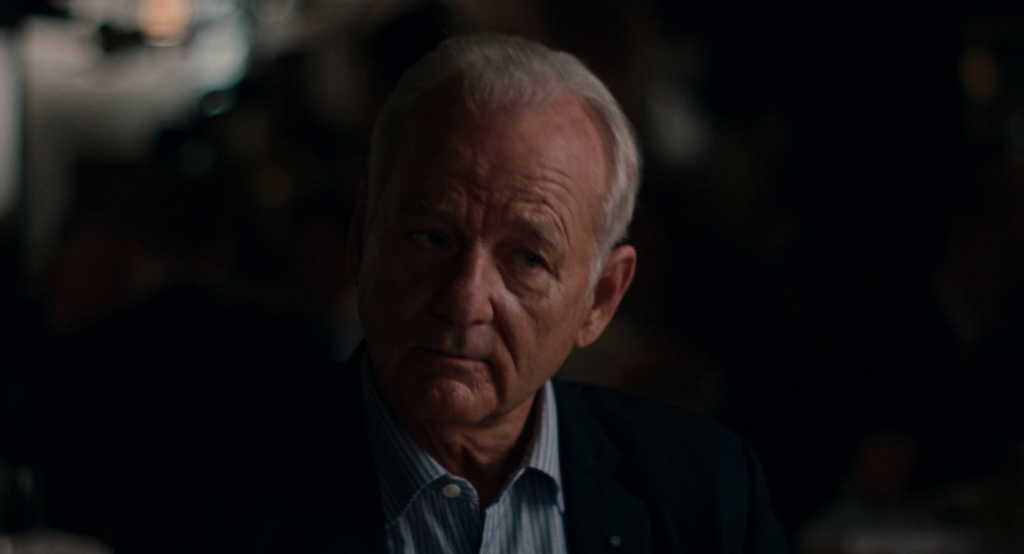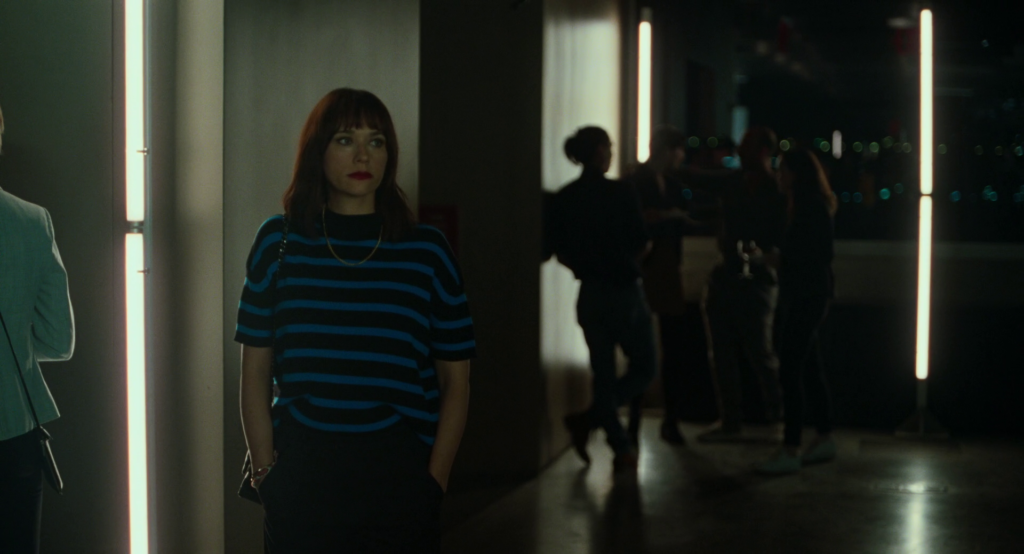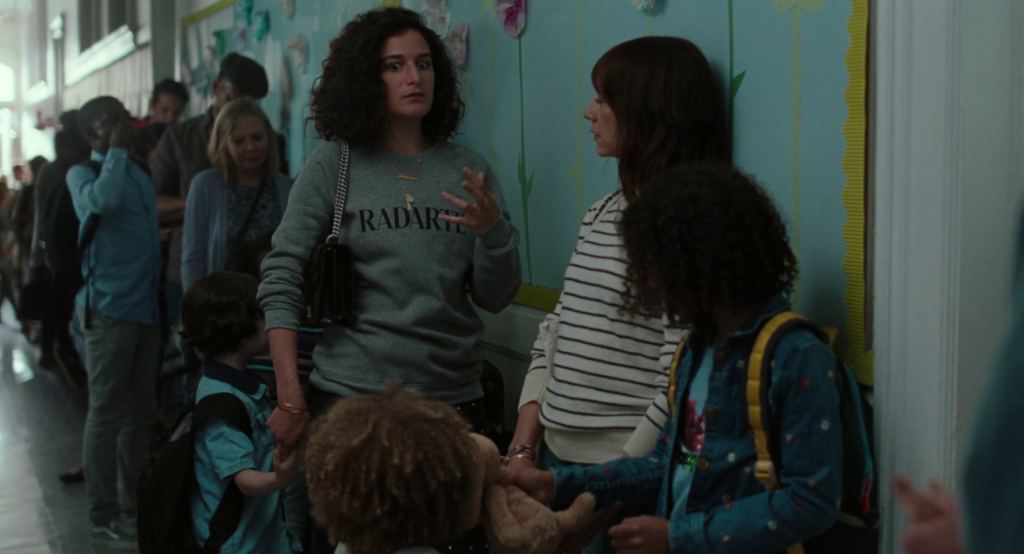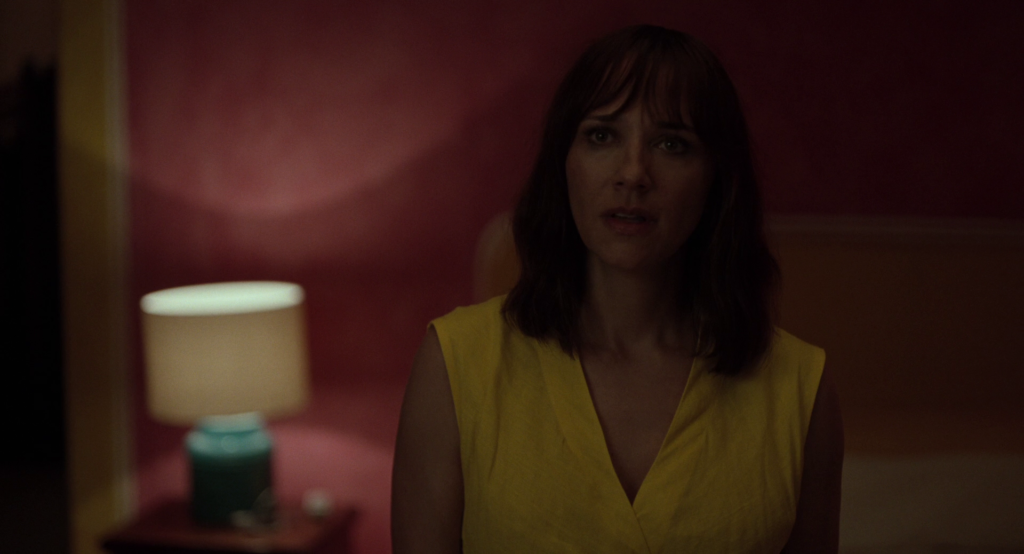
Film Review: On the Rocks
Written, co-produced, and directed by Sofia Coppola. US, 2020, 97 minutes.
Available with subscription on AppleTV+.
Sofia Coppola’s seventh feature On the Rocks is very well edited by Sarah Flack, who’s cut each of the writer/director’s films since Lost in Translation (2003). And on Rocks her work is aided yet again by maybe the most edit-friendly performer in American film comedy, Lost star Bill Murray, who back in the movie-theater days could seem to elicit a laugh with every cut-to. This new movie utilizes that quality with real finesse, always finding the right facial expression to land on (see above), or edit away from. But its shots also hold on Murray long enough to let the actor give one of his most technically-sound performances—himself aided in that regard by Coppola’s somewhat uncharacteristic deployment of classical dramatic storytelling: for On the Rocks is, more than nearly anything else she’s directed, a very traditional sort of movie, a shaky-marriage comedy where emotive performances lead the way and where everybody pretty much says what they’re feeling—which is a behavior that’s diametrically opposed to what characters do in all her other movies, where they usually just keep it to themselves.
Most people I’ve spoken with about On the Rocks seem to find it pretty slight, and on some levels I basically agree. But for me the new film nonetheless adds up to a very full expression of Coppola’s particular cinematic voice—that being a vision of the world that’s utterly overloaded with semi-personal objects and probably-autobiographical detail, yet is also quite knowingly painted over with the glossy lies of commercial narrative-film aesthetics. In turn words like frothy and wispy piled up in the reviews (Slate even published a piece ostentatiously listing its “most bougiest signifiers for your delectation and/or condemnation,”) but to me On the Rocks is once again on the other side, not just a real deal movie but one that piles up a respectable amount of dramatic weight given that it’s a lightly comic narrative about a family of very well off New Yorkers living mostly charmed lives circa 2019.
But thing is that Murray’s character Felix, a womanizing art-dealer who’s actually more of an art-dealing womanizer, is not actually the lead character. Instead that’s the quieter, more passive Laura (Rashida Jones), who’s also a very clear stand-in for the director herself—to the extent that Laura, a successful author and married mother of two, is usually costumed to look almost exactly how Coppola, a successful filmmaker and married mother of two, looks when she appears in public.

The initial spark of drama is the suggestion of a sexless marriage, which arrives in the first handful of Flack’s edits: First Laura’s topless and joyously launching herself into a pool on her wedding night, and then it’s the film’s title card, and then she’s in an apartment years later where she picks her kids’ toys off the floor before dozing off alone to a Chris Rock bit from Never Scared (2004)—the one where he concludes, if you like fuckin’, then marriage ain’t for you!
On the Rocks‘ real story begins right after that, when Laura wakes up to sloppy moves from her tech-exec husband Dean (Marlon Wayans, playing well against type as an uncharismatic dork,) who’s still semi-narcotized from a business-trip plane ride, and who seems genuinely startled when he gets a clear look at his wife’s face. That provokes in Laura the idea that he might be cheating on her—probably with his girl Friday, Fiona (Jessica Henwick). And when she confides that to Felix, he immediately starts her down an investigatory path that leads to classy, drink-laden stakeouts and relatively low-speed car chases, real classical Hollywood filmmaking stuff, a plotline as glossy as Felix’s own persona.
But those goofier sequences don’t begin in earnest until the second half of this slender picture, and then even once they do, they don’t last very long. What Coppola places emphasis on instead, especially for the first 35 minutes or so, is a documentation of the material and experiential details making up the life of an upper-class New York mom that works a culture-industry job while simultaneously raising the kids: therefore making a record of places like her exceptionally sizeable apartment in Soho on Wooster St. across from a Chanel shop (with bumper stickers for Bernie Sanders and Stacy Abrams on the wall, literally politics as decor); behaviors like playing with a labelmaker instead of getting work done on the next book (which sold in advance, one reasonably assumes with some help from her father’s apparently sizeable art-world influence); and experiences like half-assing it through bad small talk at the spouse’s management-class work party (where everyone’s really excited about how quickly the engagement numbers are going up), or pointlessly indulging dumb moms in Rodarte sweaters while picking the kids up from school (in scenes where Coppola allows her cruelly humorous mean streak to fully take hold, making very clear this portrait of Manhattan isn’t one presented in a simply humanist register).

The rhythm here is very curious. Coppola uses the score by her husband’s band Phoenix almost exactly the same way that fellow New York-based writer/director Noah Baumbach has recently been using old Georges Delerue music originally written for Truffaut movies: to underscore scenes and montages of urban foibles with the sound of comic grace, and to establish a sense of aesthetic elegance that complicates all the mean jokes—or, in other words, to create some approximation of the Stolen Kisses (1968) feeling. But Coppola doesn’t lean towards comedy like Baumbach, and doesn’t embrace cinematic artificiality like Truffaut. So her movie does achieve a vibe, but it’s not a specific one, instead just the vibe of movies in the most generic possible manner: not evoking a particular era or even a particular genre, but instead just communicating an intruding sense that what’s happening on screen is informed by, styled like, and even in thrall to a certain lineage of films that emphasize the pictorial beauty and on-the-town fun of city living—a lineage that encompasses an exceptionally wide range including Hollywood screwball comedies, Parisian romps of the postwar era, and countless New York-based film narratives of the last 50 years, all wildly different forms that On the Rocks doesn’t so much engage with but instead just nods toward one by one.
Which is to say that for all its baggage, On the Rocks plays out in a weird deadpan, not quite satirical but hardly sympathetic either. And that’s confused further by the presentation of the lead characters, which on the other hand is pretty directly sympathetic—to the point where Laura is granted a sad-faced walking montage at her lowest moment, like a teen-movie heroine (though on second thought maybe that’s quietly satirical too). But regardless of how the film is meant to play, it’s pretty hard to keep a straight face when Felix and Laura’s pursuit of Dean leads them to Mexico, except not really Mexico, but instead a condo at a resort in Mexico, at which point the film’s otherwise mostly orchestral score quickly transitions into canned mariachi music as if to underline the artificial nature of the physical settings these characters inhabit.
That’s where the film’s climactic dialogue sequences play out—not between Dean and Laura regarding his potential sneaking around, but instead between Felix and Laura regarding the former’s treatment of women in toto, which has been a recurring subject in their prior dialogues throughout the film. And however you take the humor of the film up to this point, Coppola’s writing, and Jones’ and Murray’s performances, and Flack’s editing play these scenes in an exceptionally dramatic manner: the characters don’t reach any resolution in their exchanges so much as they just further stake out their positions—Laura essentially saying that Felix is a raging misogynist doing incalculable damage to his extended family, and Felix just saying that Laura’s become a total bore—with each actor successfully bringing out the little tics and gestures that hint at the depths of their confrontation (this is what I was thinking about when I typed technically sound performance a couple of paragraphs back), all while the dialogue remains quite believably nonresolutory (and the characters’ respective refusal to budge even a tiny bit from their positions is, I think, a truly distinctive quality conjured up by Coppola, who thoroughly resists the handful of easy conclusions suggested by the plot setup).

Thus while it gestures toward this sort of mode throughout (including via a spoken reference to Bogie and Bacall), it’s only here that On the Rocks finally achieves the dramatic register of what we might once again call classical Hollywood stuff, given that by this point its most genuinely poignant moments feature movie stars doing major face-acting in patient close-ups occurring within heartfelt dialogue scenes.
But then it ends up somewhere not heartfelt, but instead very passively disquieting: What the last few minutes suggest most of all is that Laura has finally grown past a certain dependency on Felix, and can move onto being, well, not really independent, but instead at least partially dependent on another man—as established in a concluding scene that introduces a Cartier watch that’s very unmistakably meant to call back to earlier dialogue spoken by Felix about how bangles once represented a man’s ownership of his bride (as well as to another scene where Felix gifted her a watch of his own—another progression that suggests Laura as being the subject in a handoff, from one man’s watch to another’s). Which, along with the rest of the movie, dredges up a lot of thematic confusion, and a lot of what some people might call tonal flaws, like… What to think about this mostly loving portrait of a woman and her dad taking pleasure in unambiguously wealthy spaces that are at the same time framed up by the director as being somewhat distasteful and perhaps even worthy of some light contempt? What to think about this movie that seems to romanticize the passage of a middle-aged woman from her father’s hands to her husband’s, as if to ratify and perhaps even rubber stamp the former’s stated philosophical worldview of contemporary society as one defined by the treatment of women as property? And what to think about this comedy of marriage that leaves the comedy itself to the nuances of the performances while the rest of the filmmaking seems more interested in recording the physical details of a hip upper-class New Yorker’s day to day? What I think, for one thing, is that On the Rocks proves more committed to its characters, and to the milieus they’d inhabit, and to the ways they might actually behave, than to the demands of the genres and subgenres it occasionally feigns towards representing. And that for a frothy comedy to end up in a place so provocatively fraught is only to its credit. [★★★½]

